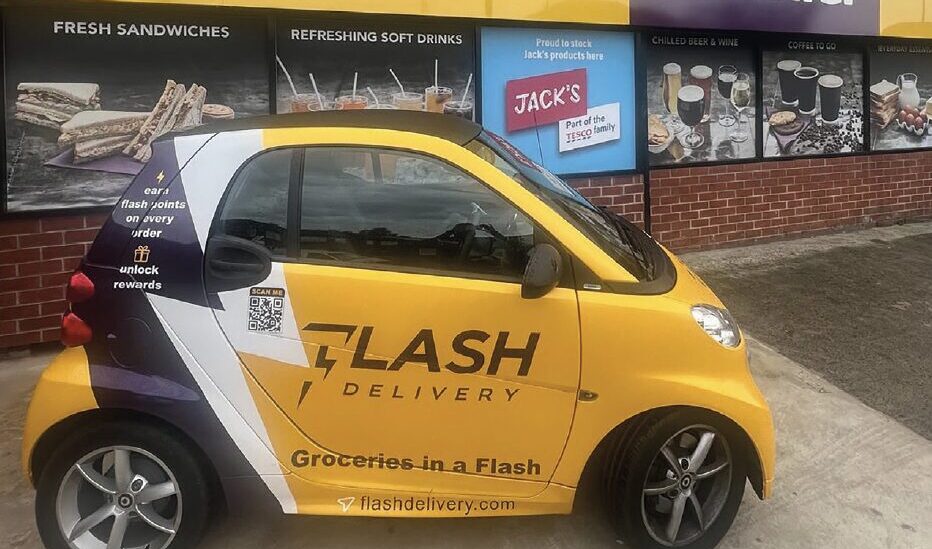The average convenience store should take £2,000- to-£3,000 per week in extra sales in their first year with Flash Delivery, director Leon Whittaker has claimed.
The grocery delivery platform, founded by Premier store owner and fellow Flash director Justin Whittaker last year, has now passed the 50-partnered-stores milestone. In an interview with Better Retailing, Leon explained: “We only came into the market a year ago. We’ve gone from £2m to £10m in revenue within that time.”
He said the average new shopper basket spend is £24 or £27.99 for those who have placed more than three orders. Around 8% of customers now pay for Flash’s £8.99 monthly Bolt subscription, offering free deliveries.
Leon said the basket value and order frequency is higher for subscribers, with stores also receiving the £8.99 fee.
The company said its growth has been fuelled by having the lowest fees of any grocery delivery firm, coupled with strong marketing and support for stores. New partnered stores pay a flat fee of £999.99 for the first year – £83 per month, before moving to £100 per month plus 30p per transaction – capped at £300 per month combined.
Describing the fees, Leon told Better Retailing: “We’ve got this incredible deal because we know once you’re on Flash, you’re not going to leave. The average store does £6,800 per week. Not every store can do that, but where I think every retailer can be in the first year is the £2,000-to-£3,000 mark, if they listen to us and do it properly. We hold their hand, tell them what to do and how to grow.”
10 retailers sign up to Flash Delivery service
The company claimed it could overcome the biggest challenges store owners face with deliveries – staffing and marketing. Leon said: “Most stores taking £15,000 or more have two people on shift – one on the till, the other filling up and jumping on till when needed. We say if you’ve got two people, the person filling shelves should be able to drive. An order comes, they pick it, pack it and take it out. That model works up to £2,000-to-£3,000 weekly sales. Above that, you need to increase staffing.”
Flash advises new joiners to buy a car for between £1,500-to-£2,500, get the vehicle wrapped to promote the service (£500) and then insure staff to drive it. “It’s a £3,000 investment that should deliver £156,000 per year in extra sales,” he explained.
A booming store Facebook page is often a necessity for driving online sales. However, Leon said Flash offers an alternative through Facebook ads. He said: “We have a marketing department that will do the Facebook ad programming, posting and designing for free. You only pay Facebook for the ad cost. One store doing that is putting in £1 and getting £2-to-£3 back.”
Another problem stores can face with deliveries is keeping availability and pricing up to date. Instead of integrating with EPoS systems to pull this data automatically, on Flash, prices and products must be manually controlled, unless the lines are part of the ‘master catalogues’ Flash can access through wholesalers including Booker and Parfetts. Leon said managing ranging and availability requires 10 minutes per day in staff time, and its onboarding team tackles the set up.
Leon said a major point of difference is that store owners become Flash ‘franchisees’, with exclusivity in the area around their store. He explained: “It means whatever a retailer puts in, they keep – they’re never going to be undercut or have to share their customers.”
Despite the growth this year, Leon admitted Flash is on track to miss its 100-store target for the end of 2024. “It might be 80 live by end of year,” he said, blaming rival Snappy Shopper. Leon claimed stores that had joined Flash had seen the service they receive from Snappy Shopper downgraded, persuading some not to join. Better Retailing understands Snappy believes the “significant investment” it makes in partnered stores requires a level of commitment from its partners.
Revealing upcoming improvements, Flash said a new AI tool would predict the next week’s online sales for each store, allowing them to plan staffing accordingly. Another will use AI to generate product descriptions for local products to boost their appeal. A new retailer dashboard and shopper-facing website is also coming soon.
Read more news and articles on grocery home delivery services



Comments
This article doesn't have any comments yet, be the first!